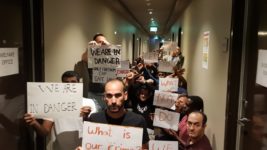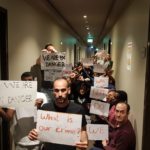Government Proposes to Ban Mobiles Phones from Detention Centres

The Federal Government has proposed new laws which would give the Immigration Minister the power to ban mobile phones, computers and other items it sees fit from detention centres and other places of immigration detainment.
The laws – a similar version of which were overturned by the Federal Court in 2018 – would also provide officers of the Australian Border Force (ABF) with broad discretion to search places of immigration detention and seize items they do not want detainees to possess.
There are concerns that the primary reason behind these new laws is to silence asylum seekers by preventing them from communicating with refugee advocates, journalists and their lawyers – in an attempt to cover-up their plight and subdue calls for their release – rather than to prevent terrorism and organised crime as the government claims.
And given the current COVID-19 lockdowns, which prevent lawyers and advocates from visiting detainees, there are fears that banning devices will compound the impact on these people – many of whom have been locked up for several years despite having committed no crime.
Connection to the outside world
Mobile phones provide asylum seekers and refugees a lifeline to the outside world – allowing them to contact friends, family, loved ones, and people who can help them, such as lawyers, advocates and mental health experts.
It is important to emphasise that these people are not committed or suspected of any crime – it is entirely legal to flee a country to seek asylum in another country, and Australia has obligations under international laws ratified locally to take them in, process them in a timely manner and treat them humanely during processing.
Keeping the government accountable
Of course, smart phones not only provide connection to people and resources, they keep the system accountable and they can be used to communicate what is going with the detention system – including the fact many have been detained for several years, and many subjected to conditions which can amount to cruel and inhumane under international law.
Refugee advocates say that Kurdish journalist Behrouz Boochani, a detainee on Manus Island who wrote an award winning book via WhatsApp, detailing his experience of the harsh reality of offshore detention, could not have done so without his phone.
For the Biloela Family too, currently detained on Christmas Island at enormous expense to Australian taxpayers, their mobile phones are the only contact they have with the outside world. Being the only detainees on the island, this contact is not vital for their health and wellbeing, it’s necessary for them to be able to contact their lawyers as they fight for the right to stay in Australia. In fact, it was via mobile phone that they were able to raise the alarm that they were being forced onto a plane back to Sri Lanka by the Australian Government.
By being able to seek help, they had the plane stopped with a last-minute injunction because Tharunicaa – the youngest child – had not yet been assessed for a protection visa.
The injunction forced the plane to land in Darwin and from there the family was then taken to Christmas Island where they remain, until their immigration status is resolved.
Only several weeks ago, A Federal Court ordered that the Federal Government pay the family’s legal costs – which are more than $200,000, after they successfully argued that after they successfully argued that Tharunicaa was denied procedural fairness in an application for a protection visa.
Concern about human rights abuses
In 2018 the Federal Court overturned a ban on mobile phones in detention centres, after a class action on behalf of about 80 asylum seekers.
Lawyer George Newhouse, who led the case, and is the chief executive of the National Justice Project, has said of the return of the legislation, “Without mobile phones, there were would be no transparency, and I have no doubt that you would see an increase in violence, human rights abuses and possibly even deaths in detention as a result.”
Refugee Council of Australia CEO Paul Power says the level of accountability in immigration detention is already “completely unacceptable” and would only get worse if this legislation was passed.
Three is currently a petition circulating on change.org, in an effort to stop the legislation. About 50,000 Australians have signed so far.








